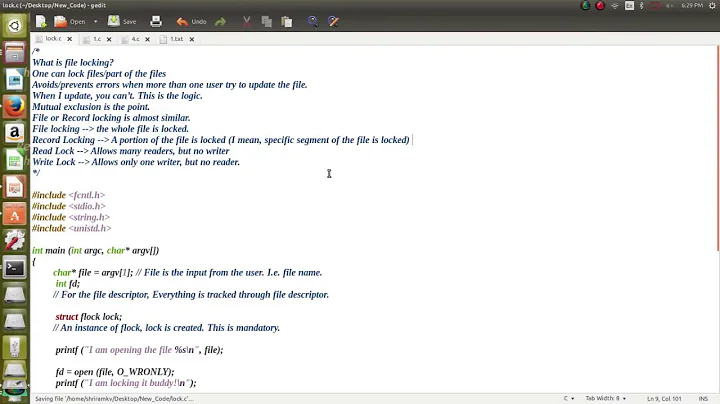Linux flock, how to "just" lock a file?
To lock the file:
exec 3>filename # open a file handle; this part will always succeed
flock -x 3 # lock the file handle; this part will block
To release the lock:
exec 3>&- # close the file handle
You can also do it the way the flock man page describes:
{
flock -x 3
...other stuff here...
} 3>filename
...in which case the file is automatically closed when the block exits. (A subshell can also be used here, via using ( ) rather than { }, but this should be a deliberate decision -- as subshells have a performance penalty, and scope variable modifications and other state changes to themselves).
If you're running a new enough version of bash, you don't need to manage file descriptor numbers by hand:
# this requires a very new bash -- 4.2 or so.
exec {lock_fd}>filename # open filename, store FD number in lock_fd
flock -x "$lock_fd" # pass that FD number to flock
exec $lock_fd>&- # later: release the lock
...now, for your function, we're going to need associative arrays and automatic FD allocation (and, to allow the same file to be locked and unlocked from different paths, GNU readlink) -- so this won't work with older bash releases:
declare -A lock_fds=() # store FDs in an associative array
getLock() {
local file=$(readlink -f "$1") # declare locals; canonicalize name
local op=$2
case $op in
LOCK_UN)
[[ ${lock_fds[$file]} ]] || return # if not locked, do nothing
exec ${lock_fds[$file]}>&- # close the FD, releasing the lock
unset lock_fds[$file] # ...and clear the map entry.
;;
LOCK_EX)
[[ ${lock_fds[$file]} ]] && return # if already locked, do nothing
local new_lock_fd # don't leak this variable
exec {new_lock_fd}>"$file" # open the file...
flock -x "$new_lock_fd" # ...lock the fd...
lock_fds[$file]=$new_lock_fd # ...and store the locked FD.
;;
esac
}
If you're on a platform where GNU readlink is unavailable, I'd suggest replacing the readlink -f call with realpath from sh-realpath by Michael Kropat (relying only on widely-available readlink functionality, not GNU extensions).
Related videos on Youtube
JorgeeFG
Updated on April 16, 2022Comments
-
JorgeeFG about 2 years
In Bash, I'm trying to make a function getLock to be used with different lock names.
function getLock { getLock_FILE="${1}" getLock_OP="${2}" case "${getLock_OP}" in "LOCK_UN") flock -u "${getLock_FILE}" rm -fr "${getLock_FILE}" ;; "LOCK_EX") flock -x "${getLock_FILE}" esac }But flock says
flock: bad number: myfilelockHow can I just lock a file, and release it when I want, without having to execute a command in the flock?
It is to be used like this:
getLock myfilelock LOCK_EX somecommands ........ getLock myfilelock LOCK_UN-
JorgeeFG almost 10 years@Jite I don't understand you. I don't wan't to lock a file from being modified, just want to get a lock on it so another process running in PHP that locks the same file, waits for it to be released.
-
Jite almost 10 yearsRedesign your script to use
flockfor every instance that needs to be lock-protected. Otherwise just create your own lock files, it's just regular files... -
Jite almost 10 yearsSo
flockworks like: process 1 executesflock lockfile command_to_run, process 2 executesflock lockfile some_command. Now the second process will be held up until the first one finishes. Simple as that. No need to even care about the lockfile itself,flockhandles that automagically. -
Charles Duffy almost 10 years
flocklocks file descriptors, not files. That's important, because it means that you cannot lock a file you aren't holding open for the duration of the lock. -
Charles Duffy almost 10 yearsFYI, the
functionkeyword is gratuitously incompatible with POSIX sh, and adds no value whatsoever over the POSIX syntax for declaring functions. Also, why use namespaced global variables when you can just use locals? Also, NEVER NEVER NEVER NEVER delete lockfiles created with flock (unless you're completely sure nobody could be trying to grab a lock at the same time -- so on reboot is safe); this creates race conditions. Leave the unlocked files on-disk to ensure that if two programs try to concurrently grab the same released lock, they get the same inode. -
JorgeeFG almost 10 years@CharlesDuffy I thought there were no local variables, do you have to use "declare" for them to be local? Thats why I used namespaces. And I should not use function keyword you say? Just name and braces?
-
Charles Duffy almost 10 years@Jorge,
declarewill make things local if used inside a function, but there's also alocalkeyword available. -
Charles Duffy almost 10 years@Jorge, ...and correct, just name and braces; the
functionkeyword makes your code incompatible with other shells, but (unlike many other, more useful bashisms) adds no value in doing so.
-
-
Himanshuman about 3 yearsexec 3>filename deletes all the file in my cwd
-
Charles Duffy about 3 years@HimanshuPoddar, yes, it's expected to truncate data in
filenameYou should use it for a lockfile. Lockfiles don't have contents (so it's typical to have access to a filedatacontrolled by.data.lock). That said, if you don't want it to truncate contents, change from3>"$file"to3>>"$file". -
Charles Duffy about 3 years@HimanshuPoddar, ...to be clear, it doesn't delete all files; it'll only overwrite contents of the one file in
filename. If you can generate a contrary minimal reproducible example (ideally something that can be demonstrated in an online sandbox like replit.com/languages/bash), please open a new question, and feel free to @ me in.








